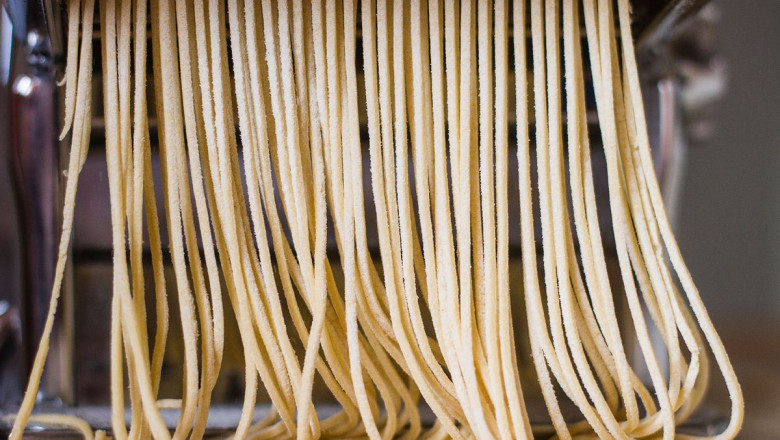
views
Barilla "pasta fraud" allegations illustrate America's food illiteracy
The pasta brand Barilla has found itself in hot water following news of a class action lawsuit in which consumers took umbrage with the slogan "Italy's No. 1 brand of pasta." Save a "few exceptions," Barilla pasta sold in U.S. stores is manufactured in facilities located in Ames, Iowa, and Avon, N.Y.
As CNN reported, Matthew Sinatro and Jessica Prost, the customers who filed the lawsuit last year, have alleged that "they bought multiple boxes of Barilla pasta thinking they were made in Italy." They also claimed that "Barilla misrepresents its Italian origin" because its packaging features the colors of the Italian flag, "perpetuating the notion that the products are authentic pastas from Italy."
The pair further alleged that the company's ad campaign positions its pastas "as authentic, genuine Italian pastas — made from ingredients sourced in Italy (like durum wheat), and manufactured in Italy." Barilla, meanwhile, has stated that "the wording on the box clearly states: 'Made in the U.S.A.'"
Related
The judge in the case has allowed the lawsuit to proceed, which, as The Takeout has speculated, could "impact labeling standards in the future." While clear, informative labels are, of course, important for consumer literacy, often when "scandals" centered around misconceptions regarding a food's quality or provenance pop up (and they've been numerous, including the recent Subway "Tunagate" lawsuit), a particular scene from the 2003 holiday classic "Elf" comes to mind.
In this scene, Buddy the Elf (played by Will Ferrell) is fresh in New York following a childhood spent in Santa Claus' North Pole workshop. He passes a no-frills diner advertising the "world's best cup of coffee." Upon seeing this sign, Buddy throws open the door and gleefully exclaims: "You did it! Congratulations! World's best cup of coffee! Great job, everybody! It's great to be here."
The joke is apparent. In a world with Vietnamese, Italian and Colombian coffee makers — it's highly unlikely that the best cup of coffee in the world would be found there. Anyone who believes otherwise, especially based solely on a window sign, is a little naive (a punchline that is further reinforced when Buddy later takes a date to the diner who discreetly spits out said coffee).
While the Barilla lawsuit describes in more nuance how the products in question are marketed, the point remains: Americans are still pretty out of touch with the origins of their food and drink, as well as the processing required to ultimately bring it to their tables.
According to research conducted at Michigan State University, much of the U.S. public "remains disengaged or misinformed about food."
"Our survey revealed that 48% of Americans say they never or rarely seek information about where their food was grown or how it was produced."
"We sampled over 1,000 Americans age 18 and over online," Sheril Kirshenbaum and Douglas Buhler wrote in The Conversation in 2017. "Results were weighted to reflect U.S. census demographics for age, sex, race/ethnicity, education, region and household income to bring them into line with their actual proportions in the population. Our survey revealed that 48% of Americans say they never or rarely seek information about where their food was grown or how it was produced."
One of the primary reasons is the continued urbanization of the U.S. Research from Cornell shows that fewer than 2% of Americans live on farms, meaning we're physically more distant from the places our food originates, as well as the human labor that underscores its production. This detachment has had real consequences on our food literacy.
For instance, in a 2011 survey of fourth and sixth graders in Southern California, only 56% could identify hamburger patties as beef, while less than 40% knew of the origin of onions and pickles. Things remain murky for American adults: A 2017 survey by the International Food Information Council Foundation found that 78% of American consumers encountered "a lot of conflicting information about what to eat and avoid."
This uncertainty about both the origin of food, as well as its respective merits, continues to play out in public via lawsuits. It's what leads to consumers believing — or at least, in the case of a past lawsuit, alleging they believed — that their $1.39 maple iced doughnuts from Krispy Kreme should contain "premium ingredients," meaning pure maple syrup as opposed to maple-flavored glaze.
This is despite the fact that pure maple syrup is incredibly work-intensive. A lot of sap is needed from the maple trees, which have to be matured for about 40 years before being tapped. That's why premium bottles can go for as much as $50 for 16 ounces. Thanks to that unseen labor, it's not an inexpensive ingredient.
Want more great food writing and recipes? Subscribe to Salon Food's newsletter, The Bite.
That same uncertainty is what allows for situations like the Subway "Tunagate" scandal, in which plaintiffs alleged that there's no actual discernible trace of tuna in the sandwich chain's tuna salad sub, to seem plausible.
And it's also what leads American consumers to allegedly think that Barilla pasta may be produced in an Italian facility from Italian wheat, then packaged, transported and sold in a U.S. supermarket at a price that averages out to roughly 12 cents per ounce of spaghetti. The price just doesn't match the desired (or perhaps, as the plaintiffs in the Barilla case would allege, advertised) quality.
Nutritious food should be considered a human right; it should also be fresh and readily accessible to all people regardless of their home address or socioeconomic background. Increased food literacy — which includes gaining a deeper understanding of the labor behind our food — is a valuable goal, as well.
Let me put it this way: There's nothing wrong with American-made pasta. There is something wrong with not knowing how it got on your plate.
Read more
by this author





















Comments
0 comment